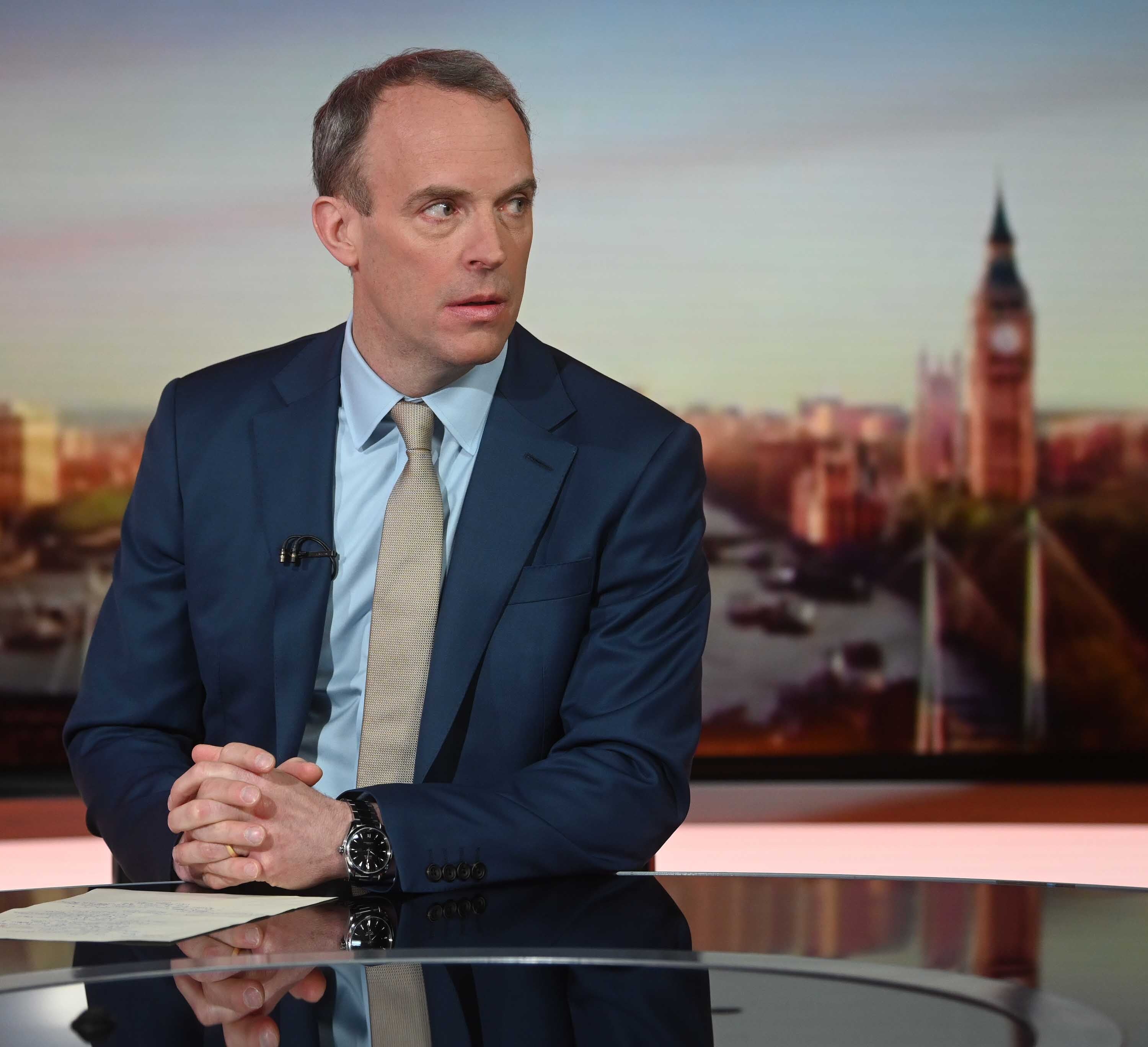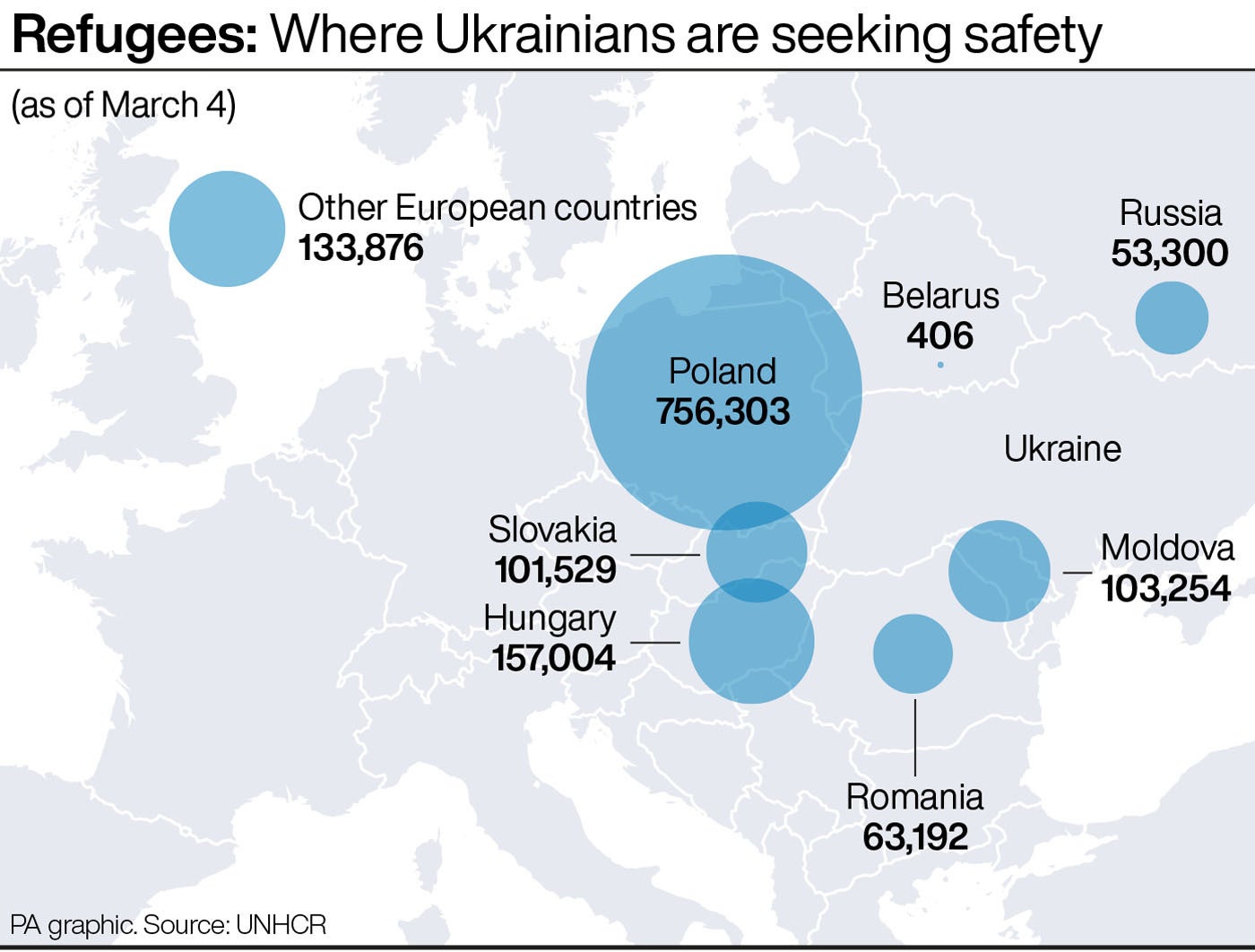
France has urged Britain to do more to help Ukrainian refugees trying to come to the UK from Calais, as Justice Secretary Dominic Raab defended the visa rules for those fleeing the conflict.
French interior minister Gerald Darmanin on Sunday said it was “inhumane” of the UK to turn away refugees arriving at the French port city if they did not have a valid visa.
He said he had asked Home Secretary Priti Patel to establish a consular presence there.
Mr Darmanin told Europe 1 radio: “I called my British counterpart twice.
“I asked her to set up a consulate in Calais that can process people’s paperwork and issue visas.”
The British must put their rhetoric into action
Hundreds of Ukrainian refugees in Calais have been told by British authorities to obtain a visa at UK consulates in Paris or Brussels, Mr Darmanin said, calling it “a bit inhumane” to expect them to travel all the way there after their long journeys from Ukraine.
“The British must put their rhetoric into action, I’ve heard the big words of generosity from Mr (Boris) Johnson,” Mr Darmanin said.
“I hope this will allow the English to open their arms a little and stop the technocratic nit-picking”.
But Home Secretary Priti Patel said nobody had been turned away.
She said: “Let me just correct what has been said by the French government. The British Government is not turning anybody around or turning anybody back at all.
“And I think it’s really important to emphasise that, particularly at this time, when all nations across Europe must work together to help and support people in need and fleeing Ukraine at this awful, awful time.”
The Home Secretary said it is “wrong to say that we are turning people back, we are not”.
She added: “I have staff in Calais to provide support to Ukrainian families that have left Ukraine to come to the United Kingdom. It is wrong and it is inaccurate to say that we are not providing support on the ground. We are.”
Asked earlier about reports that 150 Ukrainian refugees had been turned away at Calais, Mr Raab suggested support would be undermined for Ukraine if the UK lets refugees in without visas.
The Justice Secretary told the BBC’s Sunday Morning programme: “If we just open the door, not only will we not benefit the people that we need to, the genuine refugees, but I think we undermine the popular support for this very thing, so I don’t think that’s the right thing to do. We need to make sure that we’re acting for those that need our support.”
On security checks, he told ITV News: “I think we’re doing the right thing in the right way. There’s been a question about whether we should have security checks.
“This is people coming from a war zone. It is absolutely right, given the foreign fighters that are there alongside of the Russians, that we make sure that we do have security checks precisely so that our generosity is directed to those who deserve our compassion, not those who might seek to harm us.”

Mr Raab said he expects up to 200,000 Ukrainians could come to the UK through the family dependents route, while “the humanitarian route, that is uncapped”.
He said: “We’ll work with the United Nations and other agencies, but also individuals, business, charitable sponsors here, and that route for Ukrainians fleeing persecution is uncapped. And of course, we provided £220 million of humanitarian support, which is directly for the Ukrainian people, but also for those countries taking refugees.
“You find this with conflict situations, most people want to go… either stay in their country of birth and origin or go to a country nearby, so they can return later. I think we can expect that with Ukraine.”
Asked by ITV News presenter Nina Hossain whether the Government should make it as simple as it was for his father, who fled Czechoslovakia from the Nazis, to come to the UK, the Deputy Prime Minister said: “I don’t need to be lectured by you about what my father went through.

“You are talking about something you know little about. It was incredibly difficult for my father to get to the UK.”
Under the UK’s recently-extended visa scheme, Ukrainians with parents, grandparents, children and siblings already in the UK are allowed to stay for up to three years.
The offer does not match that of EU countries, which have waived visa rules for Ukrainian refugees, letting them in for up to three years without first having to seek asylum.
More than 1.5 million refugees have already streamed out of Ukraine, the United Nations said as Russia’s unprovoked assault on the country entered its 11th day on Sunday.
The UN High Commissioner for Refugees Filippo Grandi tweeted: “More than 1.5 million refugees from Ukraine have crossed into neighbouring countries in 10 days – the fastest growing refugee crisis in Europe since World War II.”







